Sheets of sound was a term coined in 1958 by Down Beat magazine jazz critic Ira Gitler to describe the new, unique improvisational style of John Coltrane. Gitler first used the term on the liner notes for Soultrane (1958).
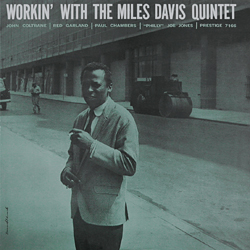
Workin' with the Miles Davis Quintet is an album recorded in 1956 by Miles Davis. Two sessions on May 11, 1956 and October 26 in the same year resulted in four albums—this one, Relaxin' with the Miles Davis Quintet, Steamin' with the Miles Davis Quintet and Cookin' with the Miles Davis Quintet. Track 2 is a composition written for Davis by Eddie Vinson. "Trane's Blues", also credited to Davis, is in fact a John Coltrane composition.
Alan Richard James Skidmore is a jazz tenor saxophonist and the son of saxophonist Jimmy Skidmore.
"Naima" is a ballad composed by John Coltrane in 1959 that he named after his wife, Juanita Naima Grubbs. It first appeared on the album Giant Steps and is notable for its use of a variety of rich chords over a bass pedal. It is mainly made up of a slow, restrained melody, though there is also a brief piano solo.

Bags & Trane is an album credited to jazz musicians Milt Jackson and John Coltrane, released in 1961 on Atlantic Records, catalogue SD 1368. Taking its title from Jackson and Coltrane's nicknames, it is the only collaborative record by the pair, although only Jackson contributed original compositions. In actuality, the album belongs in Jackson's discography, as he was the session leader and still signed to Atlantic under the auspices of the Modern Jazz Quartet, and not in that of Coltrane, who had left the label for Impulse Records at the time of this album's issue. However, like Prestige Records before them, as Coltrane's fame grew after he had stopped recording for the label, Atlantic used varied unissued recordings and released them with Coltrane's name more prominently displayed.

Soultrane is the fourth studio album by jazz musician John Coltrane, released in 1958 on Prestige Records, catalogue 7142. It was recorded at the studio of Rudy Van Gelder in Hackensack, New Jersey, three days after a Columbia Records session for Miles Davis and the Milestones album.
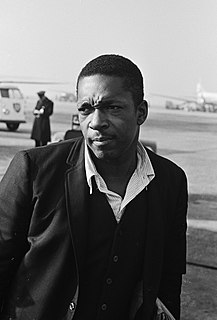
This article presents the discography of the jazz saxophonist and band leader John Coltrane.
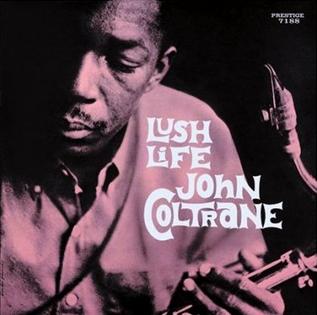
Lush Life is an album credited to jazz musician John Coltrane, released in 1961 on Prestige Records, catalogue 7188. It is assembled from unissued results of three separate recording sessions at Van Gelder Studio in Hackensack, New Jersey in 1957 and 1958. As Coltrane's fame grew during the 1960s long after he had stopped recording for the label, Prestige used unissued recordings to create new marketable albums without Coltrane's input or approval.

The Last Trane is an album credited to jazz musician John Coltrane, released in 1966 on Prestige Records, catalogue 7378.
The Heavyweight Champion: The Complete Atlantic Recordings is a 1995 box set by jazz musician John Coltrane. It features all of the recordings Coltrane made for Atlantic Records, spanning January 15, 1959 to May 25, 1961.
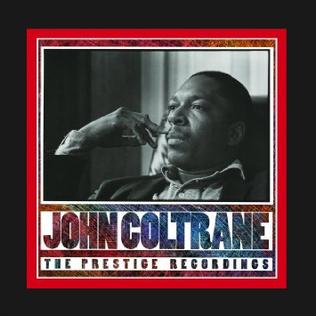
The Prestige Recordings is a box set by jazz musician John Coltrane.

Coltrane "Live" at the Village Vanguard is the tenth album by jazz musician John Coltrane and his first live album, released in 1962 on Impulse Records, catalogue A-10. It is the first album to feature the members of the classic quartet of himself with McCoy Tyner, Jimmy Garrison, and Elvin Jones. In contrast to his previous album for Impulse!, this one generated much turmoil among both critics and audience alike with its challenging music.

Trane's Blues is a compact disc credited to the jazz musician John Coltrane, released in 1999 on Blue Note Records, catalogue 98240. It comprises recordings from sessions for Blue Note and United Artists Records as a sideman for Paul Chambers, Sonny Clark, Johnny Griffin, and Cecil Taylor that were issued respectively on their Whims of Chambers, Sonny's Crib, A Blowin' Session, and Hard Driving Jazz albums. Two selections are from Coltrane's own 1957 Blue Train, and "One for Four" had been previously unissued. "Trane's Blues" had been issued on the compilation High Step in 1975, previously known as "John Paul Jones" and named after himself, the bass player Chambers, and the drummer Philly Joe Jones. Like Prestige Records before them, as Coltrane's fame grew long after he had stopped recording for the label, Blue Note used varied recordings, often those where Coltrane had been merely a sideman, and reissued them as a new album with Coltrane's name prominently displayed. In this case, the Big Four conglomerate EMI continued that earlier practice.

High Step is a jazz double album credited to bassist Paul Chambers and saxophonist John Coltrane, issued in 1975 on Blue Note Records, catalogue BN-LA451. It is a compilation taken from the 1956 Chambers' Music on the Jazz West label and Whims of Chambers, along with two unissued recordings from a session in Boston, Massachusetts, "Trane's Strain" from that session previously appearing on an anthology. Originally, all of these sessions were led by Chambers, but like Prestige Records before them, as Coltrane's fame grew long after he had stopped recording for the label, Blue Note used varied recordings where Coltrane had been merely a sideman, and reissued them with Coltrane's name more prominently displayed.

Four for Trane is a studio album by Archie Shepp released on Impulse! Records in 1964. Four of the five tracks are reworkings of pieces originally recorded on John Coltrane's 1960 Giant Steps and Coltrane Plays the Blues, rearranged by Shepp and Roswell Rudd. Coltrane himself co-produced the album alongside Bob Thiele.

The A-Trane is a jazz club in Berlin, Germany.
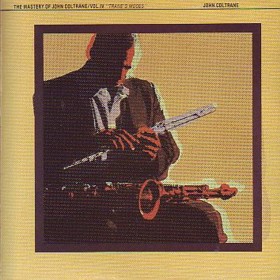
The Mastery of John Coltrane, Vol. IV: Trane's Modes is a compilation album by American saxophonist John Coltrane, released as a double LP in 1979. It features pieces recorded in 1961, two in studio and the remainder live. All the tracks were previously unissued, at the time of release. At present, "Africa " and "The Damned Don't Cry" may be found on the two-disc reissue of Africa/Brass, while all the live pieces have been included on The Complete 1961 Village Vanguard Recordings.

Chasing Trane: The John Coltrane Documentary is a 2016 American documentary film, written and directed by John Scheinfeld.













